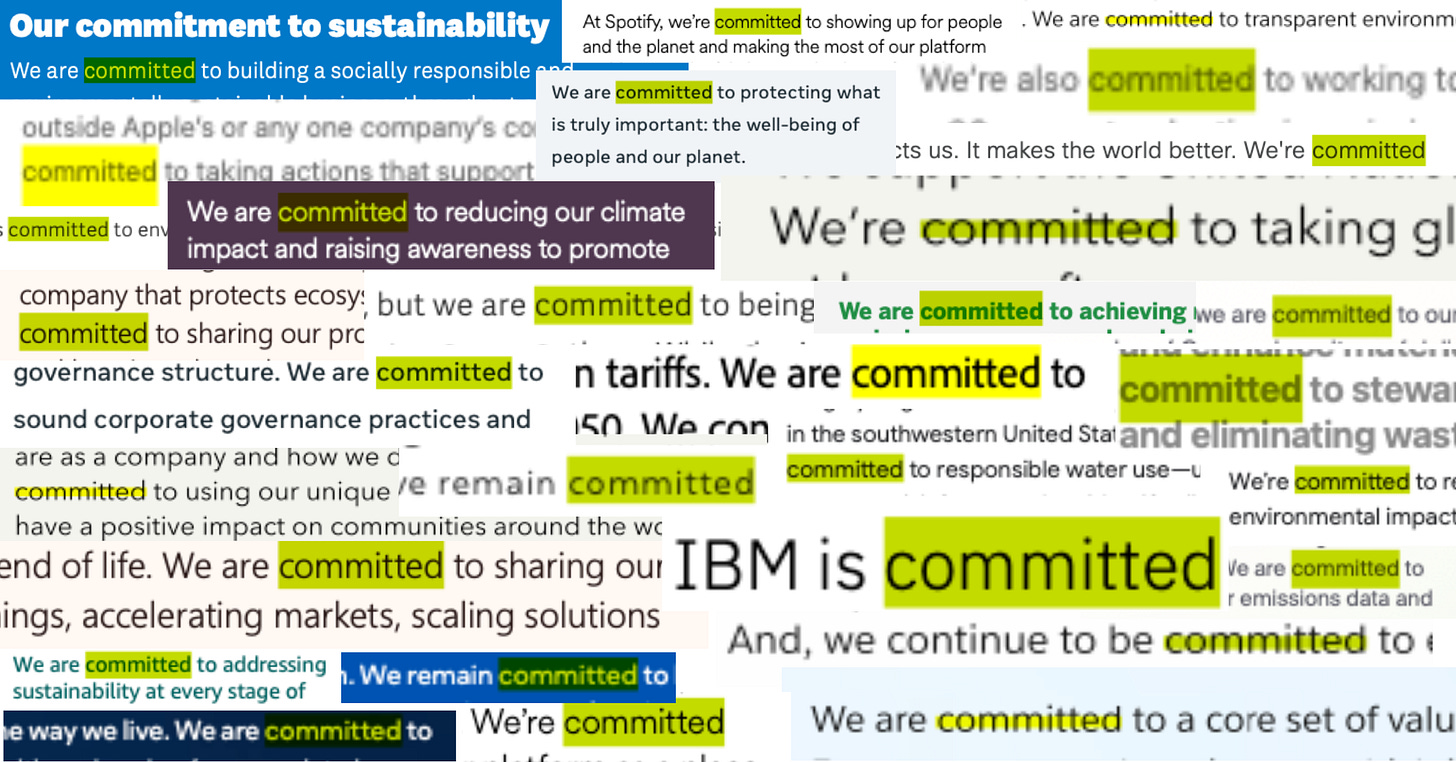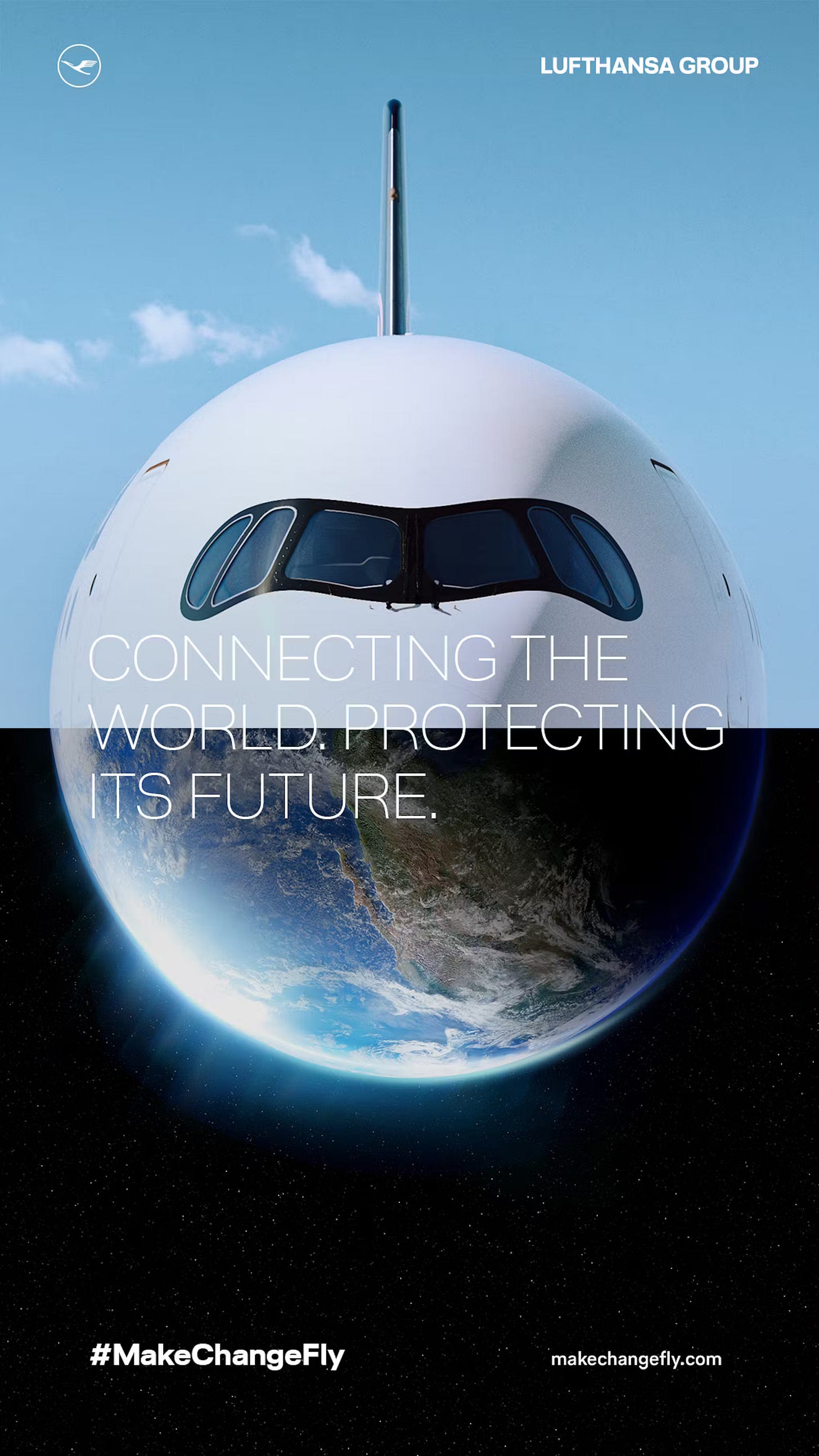TCC #57 — Sustainability in the present tense
It's hard to stay present when there's nothing to say
Good morning folks— I hope you’re staying sane in the midst of all the bad news out there. I know it’s taken a toll on Meg and me.
Today I want to talk about something that is often absent from corporate climate communications: the present tense.
If you’ve spent any time reading ESG reports like Meg and I have, or browsed a company’s sustainability webpage or read through a brochure on their climate action, you’ll notice something that’s almost universal: most corporate sustainability communications are framed in the future tense.
Usually this takes the form of targets they’ve spent years designing but haven’t actually started working towards, or actions they’ll take in the future (usually carbon removals, and even then they’re unlikely to truly commit). Unfortunately, too much climate talk centres around what companies are committed to and not what they’ve already done.
In the early days of corporate climate action, it would have been easier to excuse future-focused dialogue. Of course it’s all about the future — we have to set targets before we can get started.
But it’s not early days of corporate sustainability anymore. Companies with climate targets have had multiple years to start doing something — and yet much of what they’re doing amounts to a) buying carbon credits, if you’re lucky; b) forcing suppliers to decarbonize, or at least commit to decarbonizing some other day; and c) updating or quietly walking back on previously publicised commitments.
I should mention, d) reporting.
When you’re spending the majority of your time trying to figure out whether you’re getting scammed on a carbon credit purchase and coaxing data out of suppliers, only to have to turn around and do it all again next year, there’s not a whole lot left in the tank for actually doing anything.
Here I am, criticising companies for letting reporting take centre-stage. It probably seems like, by extension, I’m criticising the whole practice of sustainability communications. And maybe I am. If communicating your sustainability actions is getting in the way of actually doing them, then we’ve failed as communicators.
Is that what’s really happening though? Or are we spending more time communicating simply because there’s not much to actually report on?
As Meg and I will tell you from our experience as freelance writers, writing takes a lot longer when the client gives you nothing to go on. Content made up out of thin air is actually quite taxing to write — let alone to read.
So what are some red flags you should avoid, then?
Here’s what Meg and I see in a lot of the sustainability reports and comms we read:
Lots of ‘committed’ talk — so much so that it took me no time at all to make this fun graphic.
Lots of talk about targets — ironic, when so many of them are being walked back or scrubbed off the SBTi website. We see lots of roadmaps, lots of carefully extrapolated calculations to get companies where they need to be just in time. And yet their reported data reveals that most companies are nowhere near on track.
Lots of talk about better futures. I hate this kind of talk because it makes sustainability sound like charity (we won’t be here, but this is a gift to future generations because we’re so generous). It’s also just really hard to get excited about some vague future.
A lack of time-series data. The bigger companies tend to present a few years’ worth of emissions data, but on other metrics, it can be hard to gauge how much companies have actually improved over the years. What’s even worse than not presenting progress is presenting setbacks in ways that look like progress. Case in point (and yes, I’m going to keep using this example because it pisses me off) — the big ol’ green tick Microsoft gave itself for totally blowing out on its Scope 3 emissions last year. Nice one, Msoft.
Rarely do we see more present than future talk in sustainability communications. Whether they’re talking about emissions reductions, or biodiversity action, or even high-quality carbon removals, most companies devote far more page space to what they will do and nowhere near enough to what they have done or what they are doing.
This is problematic for two reasons.
It’s wasteful.
The first is that talking about what may or may not happen in the future (especially when it’s shrouded in disclaimers) is pointless. It’s a waste of words and time. We don’t need to keep talking about targets that have already been set. If you spend part of every year writing about the targets you’ll achieve at a later date, you’re stealing time and budget from actual climate action.
And it might be illegal.
The second is that making future action the focus of your communications is a subtle but serious form of greenwashing. When you constantly talk about all the goals you’re deeply committed to, it’s easy for your audience to assume that this means you’re doing something about them. If your goal is net zero and you keep talking about it, people probably think your emissions went down this year (haha).
Thankfully, this kind of ‘future-washing’ is actually being picked up by the courts. In 2023, Germain airline Lufthansa was sued for greenwashing based on a future-focused campaign about achieving carbon neutrality by 2050 and cutting carbon emissions in half by 2030.
Here’s a telling extract reported in The Drum:
We considered the claim [‘Protecting its Future’] was likely to be understood by consumers to mean that Lufthansa had already taken significant mitigating steps to ensure that the net environmental impact of their business was not harmful.
We noted the initiatives and targets Lufthansa said it was committed to delivering in pursuit of its stated goal, but many of these initiatives were targeted to deliver results only years or decades into the future. We also understood that there were currently no environmental initiatives or commercially viable technologies in the aviation industry that would substantiate the absolute green claim ‘Protecting its Future’ as we considered consumers would interpret it.
Let Lufthansa be the crash test dummy here. Don’t fall for the trap of making your sustainability communications all about the future at the expense of the present. It doesn’t get us anywhere.







Meg, Amelia, how do you feel about the word 'sustainability'? For me, it's beginning to lose all meaning. Like 'ecotourism', it seems to me people use it too easily now, without thinking, without it being earned. Would be interested in hearing your thoughts. Perhaps a topic for another post? ;-)